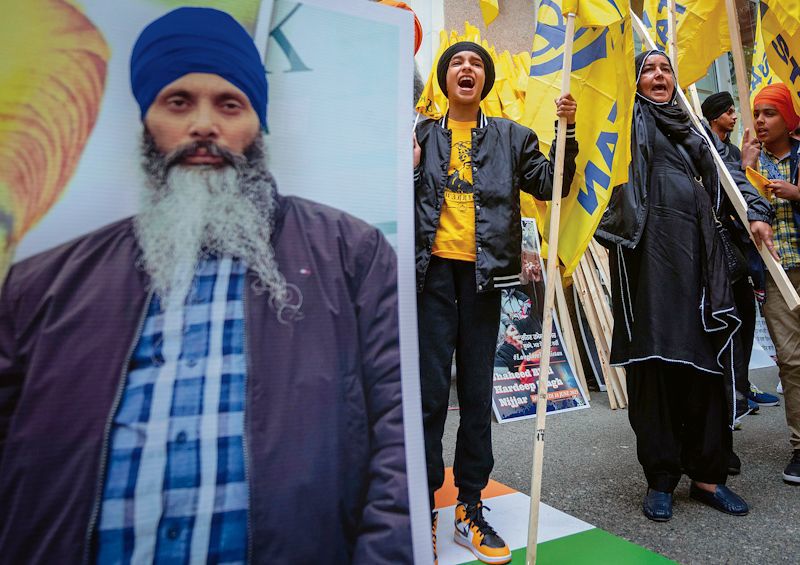Canada’s provocations know no bounds
ON June 18, a year after the killing of Hardeep Singh Nijjar in Surrey, British Columbia, the Canadian authorities allowed a ‘mock trial’ in front of the Consulate General of India (CGI) in Vancouver. According to a report carried by the Canadian Broadcasting Corporation (CBC), “an effigy of Modi, dressed in prison stripes, was paraded down the street in a makeshift cage before the mock trial began”. Photographs of the encaged effigy were carried in the Canadian media.
PM Justin Trudeau has subordinated his India policy to his politics. Canadian Sikh votes are vital for his Liberal Party.
This outrageous protest was organised by supporters of Nijjar, who was declared a terrorist under Indian laws a few years ago; he advocated violent secessionism. Once again, Canada ignored this while giving permission for the outrage against a foreign leader. So did the Canadian Parliament. It paid homage to Nijjar on his death anniversary. It is one matter for the Canadian Government to consider the killing of its national by proxies of foreign agents as a violation of its sovereignty and quite another for its Parliament to honour the memory of one who advocated violence. Canada simply does not get this basic fact.
Canada also does not appreciate what its veteran journalist Stephen Maher has noted in his recently published book on Prime Minister Justin Trudeau, The Prince: “The dream of an independent Khalistan in Punjab, an idea long dead in India, lives on in the minds of many Canadian Sikhs.” Instead of giving its people a reality check, Canada has not discouraged violence and separatism among some of its misguided people.
India’s reaction to Canada’s recent provocations was subdued. The Ministry of External Affairs’ spokesperson said on June 21: “We naturally oppose any moves giving political space to extremists and those advocating violence.” He also reiterated the government’s serious concern over Khalistani and anti-Indian activities in Canada. The spokesperson should have specifically denounced Canada for allowing the highly objectionable protest in front of the CGI. And, this occurred after Prime Minister Narendra Modi shook hands with Trudeau at the G7 summit in Italy recently. While Modi merely tweeted a photograph of his interaction, Trudeau told CBC on June 17: “Now that he is through his election, I think that there is an opportunity for us to engage, including on some very serious issues around national security and keeping Canadians safe and the rule of law”. These are obviously code words for the Nijjar killing. Trudeau can hardly expect that Modi will be willing to ‘engage’ after what he allowed on Nijjar’s death anniversary.
Trudeau has subordinated his India policy to his politics. Canadian Sikh votes are vital for his Liberal Party. Maher notes in The Prince: “The Liberals want Sikh votes. The Conservatives are after the Hindus.” Besides, Trudeau is dependent on Jagmeet Singh’s New Democratic Party for a majority in Parliament; his own party is in a minority. Thus, more than the claim that seeking secession is not against Canadian law, it is Trudeau’s political compulsions that have consistently led him to ignore India’s concerns.
Soon after returning home following the G20 summit in New Delhi in September last year, Trudeau informed the Canadian Parliament that the country’s agencies were “actively pursuing credible allegations of a potential link between agents of the Government of India” and Nijjar’s killing. He gave no information or evidence to back his claim. Initially, he secured the support of the Opposition parties, but later they asked Trudeau to back his claim with evidence. On its part, India dismissed Trudeau’s assertion as ‘absurd’. Bilateral relations hit a new low as Canada expelled an Indian diplomat and India responded in kind. Later, India asked Canada to heavily reduce the strength of its diplomatic staff. Canada reluctantly complied. An early improvement in ties is unlikely, considering India’s sharp remarks on the anniversary of the Air India’s Kanishka bombing of June 23, 1985.
Some weeks ago, a sanitised report of the National Security and Intelligence Committee of Canada’s Parliament was made public. It claimed that after China, India interfered the most in Canada’s internal affairs. The report asserted that India intervened through its diaspora, cultivating politicians and the media to manage criticism directed against it. Also, that it funded Canadian social and political actors. India rejected charges of seeking to influence Canadian affairs, including its elections. The fact is that seeking to build influence within a country is acceptable diplomatic activity. Yes, no country should interfere in the elections of another, but the truth is that all who can, try to do so subtly. This is the way the global diplomatic game is played and it is pointless for any country to get sanctimonious about it. All countries have to build their political defences against such activity.
Naturally, this is a far cry from fomenting violence against individuals or groups. Canada arrested three Indian nationals — Karan Brar, Kamalpreet Singh and Karanpreet Singh — on May 3 in connection with the Nijjar case. On May 12, it arrested a fourth Indian — Amandeep Singh. India has clarified that it does not pursue a policy of carrying out targeted killings or promoting violence abroad. It has stressed this in the Gurpatwant Singh Pannun case, in which American law enforcement agencies claim that they foiled an attempt to kill the prominent Khalistani supporter. The US has succeeded in extraditing Nikhil Gupta, an Indian national, from the Czech Republic; its agencies assert that Gupta was acting on behalf of unnamed Indian officials to tie up the assassination bid.
Till now, despite the arrests, Canada has not named any individual having connections with Indian agencies or an Indian official in the Nijjar case. India will follow the trial of the arrested persons with great interest. National elections are due in Canada in October 2025. Trudeau can be expected to try to get the Nijjar trial over by then.









